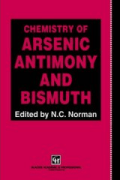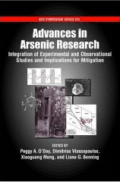Arsenic
Chemistry and physics of the chemical element arsenic and its compounds.
Arsenic - symbol As, atomic number 33 - is a metalloid chemical element in the nitrogen group (group 15).
Online available information resources about the chemistry and physics of arsenic and the arsenic compounds.
Content
Current Articles
Arsenic Detection with Gold Nanoparticles
Arsenic and gold clusters: Fast, easy, and highly sensitive arsenic detection with gold nanoparticles
Arsenic-Tolerant Plants
Using plants against soils contaminated with arsenic. Two essential genes that control the accumulation and detoxification of arsenic in plant cells have been identified
Black Arsenic
Synthesis and identification of metastable compounds
Montana State team finds Yellowstone alga that detoxifies arsenic
Arsenic may be tough, but scientists have found a Yellowstone National Park alga that's tougher.
Phar Lap: Death by Arsenic
Hair analysis proves it: Legendary racehorse died of arsenic poisoning in 1932
Information and data about the element
Arsenic, As
Chemical and physical properties. Webelements, UK
Arsenic, As
Comprehensive data. Environmental Chemistry, USA
Arsenic, As
Chemical and physical data. Visual Elements, Chemsoc, UK
Chemistry and Remediation of Arsenic
A view from the private sector - Format: PDF
Speciation chemistry of arsenic
An overwiew - Format: PDF
Atom, Orbitals, Radiochemistry
Atomic Data for Arsenic (As)
Basic Atomic Spectroscopic Data. NIST, USA
Isotopes of Arsenic
All known isotopes of the chemical element arsenic.
Radiochemistry of Arsenic
PDF document, National Research Council - Format: PDF
Compounds
Arsenic and arsenic compounds
Database search form for arsenic and arsenic compounds: properties, safety data, available products etc.
Analysis and Determination
Analytical Methods: Arsenic, Arsenic trioxide, Arsine
Elements by ICP (aqua regia ashing; hotblock/HCI/HNO3 disgestion). NIOSH Manual of Analytical Methods. NMAM, USA - Format: PDF
Geochemistry and Biogeochemistry
Arsenic
Statistics and Information. U.S. Geological Survey
Arsenic Minerals
The mineralogy of Arsenic. Webmineral
Environmental Chemistry
Arsenic Removal
Collection of documents. EPA
Arsenic Removal
... by ion exchange. EPA, USA
Toxicology and Medicinal Chemistry
Arsenic
US National Library of Medicine information on arsenic poisoning with links to reviews and articles
Arsenic
Chemical Profile for Arsenic. Scorecard, Pollution Information Site (USA) [e]
Arsenic
Air Quality Guidelines. WHO - Format: PDF
Arsenic
Halth topics. WHO
Arsenic
Safety and Health Topics. Occupational Safety & Health Administration, USA
Arsenic and arsenic compounds
Chronic toxicity summary, 2000 - Format: PDF
Arsenic and arsenic compounds of environmental importance
This report contains the collective views of international groups of experts and does not necessarily represent the decisions or the stated policy of the United Nations Environment Programme
Arsenic in Drinking Water
EPA Safewater Home
Arsine
Chemical Profile for Arsine; pollution information site. Scorecard, USA
Arsine
Medical Management Guidelines for Arsine. ATSDR, USA
Chronic Arsenic Poisoning
History, Study and Remediation
ToxFAQs� for Arsenic
This fact sheet answers the most frequently asked health questions about arsenic. ATSDR, USA
Toxicological Profile for Arsenic
The ATSDR toxicological profile succinctly characterizes the toxicologic and adverse health effects information for the hazardous substance described there
Related Books and Scientific Literature: Arsenic
Nicholas C. Norman
Chemistry of Arsenic, Antimony and Bismuth
This book provides a detailed, wide ranging and up-to-date review of all aspects of the chemistry of the elements arsenic, antimony and bismuth. The chapters are written by an international team of authors each of whom is both active and expert in their particular field. The coverage includes chapters on general properties and periodicity, the elements themselves, inorganic derivatives of the elements, co-ordination and solution chemistry, organocompounds, organotransition metal compounds, environmental and medicinal aspects and analytical methods. This volume will be of particular value to graduate and postgraduate chemists and materials scientists in both industry and academia who are concerned with any aspect of the chemistry of these three elements and will also be an essential addition to the reference section of any chemistry library.
Springer; 2006
Peggy, A. O'Day, Dimitrios Vlassopoulos, Xiaoguang Meng
The realization during the last decade that many water supplies worldwide are affected by arsenic at concentrations above acceptable health levels has motivated research directed at understanding the occurrence, distribution, and mobilization of arsenic in the environment, and stimulated the development of new, cost-effective treatment technologies. Arsenic accumulation and migration is closely tied to its chemical speciation, which is often controlled by a complex combination of abiotic and biotic processes coupled with physical transport. This symposium volume focuses on bridging the gap between different approaches and scales of investigation and on fostering a more unified understanding of arsenic occurrence and behavior, including geological, geochemical, hydrological, microbiological, ecological, and engineering aspects of arsenic-related research. Papers in this volume highlight a variety of new research directed at understanding the sources, distribution, and mobilization of arsenic in the environment. It includes recent efforts in the development of cost effective treatment technologies and in approaches to natural attenuation and accelerated remediation methods. These topics are thematically organized into three sections in the volume, the first focusing on laboratory studies and theoretical modeling, the second on arsenic behavior and cycling in a range of field settings, and the third on studies associated with treatment and remediation technologies and methods. This book is targeted at scientists and engineers (chemists, geochemists, geologists, hydrogeologists, microbiologists, molecular biologists, chemical engineers, environmental engineers) as well as graduate students who are engaged in research on arsenic in both natural and engineered aqueous systems, and on the development of methods for arsenic treatment and removal.
American Chemical Society; 2006
About this site
The author- or copyrights of the listed Internet pages are held by the respective authors or site operators, who are also responsible for the content of the presentations.
To include your website to the Internetchemistry directory, please use our registration form or send us an eMail.
Entries: 32
Update: 13.04.2016
Keywords: Arsenic, As, Pnictogen, Pnictogens, group 5, V, 15, metals, minerals, periodic table, chemical element, properties, datas, chemistry, physics, traders, manufacturers, producer, chemical compounds
Permalink: http://www.internetchemistry.com/chemical-elements/arsenic.php
(C) 1996 - 2018 Internetchemistry









